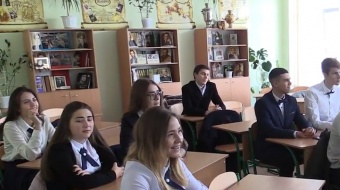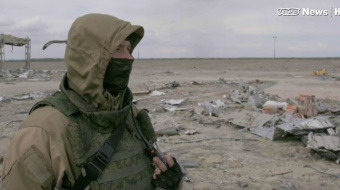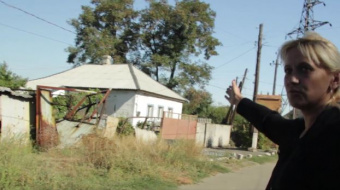A year without home. The problems IDPs from the Crimea and Donbas face. Part 1
A year without home. The problems IDPs from the Crimea and Donbas face. Part 1
Thousands of people had to leave their homes and move to peaceful regions of Ukraine after the Crimea had been occupied and the war in the Donbas had broken out.
According to the UN information, last April there were more than 1.2 million IDPs in Ukraine. The majority of them (about 800 thousand) decided not to go far away from home and moved to that part of the Donbas which is not occupied, to the Kharkiv, Dnipropetrovsk and Zaporizhzhya regions.
These pople often call themselves refugees as they had to seek refuge from hostilities. Every person had their motive and their story.
Ukraine has never faced such a problem so the way it had to work with IDPs has been an all-time experiment and an efficient mechanism which would help solve their problems has not been created yet. A lot of work is done by volunteers and, of course, there are still a lot of problems to be solved.
Oksana Mikheeva and Victoria Sereda studied IPDs' stories and conducted a research for Ukrainian Peacekeeping School.
“The Ukrainska Pravda” tried to outline the main tendencies which kade Ukrinians seek a new home.
Going away from the war
Internally displaced persons who come from the Crimea name different reasons of leaving home: insults, aggression, persecution.
The majority from IDPs from the occupied East of Ukraine name the same reason — their life was under a threat.
Oleksandra Dvoretska, “Vostok-SOS” volunteer movement coordinator, says: “Practically all the reasons are about the same thing: people want to have peacefully, not to worry that their children can be killed by a shell or bullet, that their husband can be captured or they will be forced to compulsory labour due to a neighbour's complaint. A lot of people say that they cannot live in basements without water or heating any more.”
Back there, at home, people are divided into pro-Russian militants' partisans and opponents. "I arrived in Lviv at the end of June, after the rmed hostilities at Donetsk Airport took place. Although, I had learnt that it was dangerous to remain at home much earlier as I had been a participant of Donetsk Euromaidan rallies. I had never thought before that I had to conceal my political views from other people or switch to the Russian language (from Ukrainian) when I got a phone call from home while being at work”, says Solomia Vysotska, PhD.
Her family comes from Lviv so she did not think much before moving there. Today she teaches English at Ukrainian Catholic University and “Lviv Polytechnic” National University and she is also a translator at “Donbas Public TV”.
Stanyslav Fedorchuk, one of the members of Donetsk Euromaidan working group, had to leave Donetsk even earlier than Solomia. "My family and me were threatened and after several attcks, which the police turned a blind eye to, I had to run away to Georgia with my wife and two-months-old baby. In June I moved to Kyiv and then to Lviv.”
Some people are ready to risk their lives remaining on occupied territories, but some families with children decided to leave the occupied part of the Donbas. Those who were short of money, tried to take away their children sacrificing themselves.
Those who decided to stay at home to guard it became victims as well as the IDPs have heard about the cases when “DPR authorities” give “abandoned dwelling” to those whose houses were destroyed in the war.
Peole are so afraid of this that they are ready to risk their lives and to stay at home not to be deprived of their house of flat.
Seniors refuse to leave as well. They do not want to start their lives from a scratch and to become a millstones around their relatives' necks. "We were just running away, we took almost nothing with us as we were short of time. Life is hard here in many aspects, for example we are short of clothes. My brother's-in-law wages have been on arrears for several weeks . The family wants to go back”, says a Donetsk resident who moved to Chernihiv with all her family.
Those who have grown desperate as they cannot find a job in Ukraine and hope that their old connections will help them at home, want to return.
Tetyana Minaylo's family managed to take only several jackets with then when they were leaving home, still, they are not going to come back yet: “We left when they started shooting. In fact, we took only documents with us. We were leaving for ten days and did not even think that we would not be able to come back.” The Minaylos stayed in Yuriivka (a village in Mariupol vicinity) till the end of the summer and then moved to Mariupol. A lot of Tatyana's relatives still remain on the occupied territory.
There are a lot of cases when only a part of a family moves away.
Eva Gukalova, a coordinator of NGO “Kharkiv Station” told us more about this: "Very often men move away to settle down and arrange a place for their family or a mother leaves to take away the children and the father stays to look after the house. Sometimes grandmothers take children away. There are even cases when wives run away from their husbands who have joined militants."
Yevheniy Kaplin, head of Kharkiv humanitarion mission “Proliska” , names one more reason: "Men are often detained by “LPR” and made join the “army”. Ukrainian authorities do not welcome men who leave the occupied territories as well though the majority of these men have not taken part in hostilities."
Many people were postponing leaving their homes as they were sure that all the events would end soon. People were waiting for official leaves, trying to keep their work place and not to lose their labour record (the years which a person has worked are recorded in a labour book and then the retirement pension is assigned according to the data).
A woman who came from the town of Schastya says: "I was waiting as long as I could but then I suddenly understood that there was no sense in sitting and feeling fear. We were hiding in basements, in the bathroom, in the toilet. I would cover the windows with materasses and hid my kids behind those materasses. I would then sit in a small cupboard in the kitchen."
While choosing a new home, IDPs try to move to the places where they can find a job and where they have relatives or friends who can host them at least at the beginning. People tend to choose the localities where they used to live, study or work.
A lot of people do not move far away from their homes as they hope to come back one day.
Stereotypes about “Right Sector” or “banderivtsy” influence the choice of locality as well.
Those whose companies moved to calm regions of Ukraine and took them to a new place of work feel more at ease. As Crimean servicemen they keep their work place and get an allowance to pay the rent for the flat.
Relogious communitites, as protestants and Jehowa Witnesses, for example, support their parish. They were forced to leave occupied Donetsk as only those Orthodox churches which subordinate to Moscow Patriarchate can exist there.
Oleksiy Kovalenko for UT.
Please follow the link to read the 2nd part of the story
New service "Explain Ukraine". This is a daily mailout of five articles which were written about the situation in the Donbas by Donbas journalists and translated into English. Honest vision of people who work in the field is unbiased and fresh which is crucial in the world which is full of desinformation and propaganda. We try to share this vision in out daily mailout. You can subscribe here.














